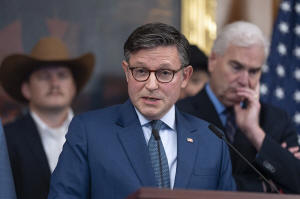House approves bills to reshape DC's criminal justice system
[September 17, 2025]
By GARY FIELDS and MATT BROWN
WASHINGTON (AP) — The House passed legislation Tuesday that would
overhaul how youth who commit crimes are prosecuted in the District of
Columbia as congressional Republicans mobilized behind President Donald
Trump's efforts to crack down on crime in the nation's capital.
One of the bills, called the “DC Crimes Act," would lower the age of a
youth offender in the federal district from 24 to 18 and require that
criminal sentencing be at least as long as the mandatory minimums for
adults, overruling local D.C. policy. It would also require the D.C.
attorney general to establish a public website that would publish
statistics on youth criminal acts.
The bill passed 240-179, with 30 Democrats joining Republicans in
support.
A second bill, the D.C. Juvenile Sentencing Reform Act passed by a
narrower 225-203 margin, with eight Democrats backing the measure and
one Republican — Rep. Thomas Massie of Kentucky — voting against it.
Massie was the lone Republican to oppose both bills.
The debate over D.C.’s laws comes as the district’s self-governance is
being challenged in ways never before seen since the passage of the Home
Rule Act of 1973. Thousands of National Guard troops and federal law
enforcement officers are patrolling the city's streets, thanks to a
now-lapsed emergency order from Trump. Republicans have cheered the
intervention and criticized how the city is run.
The city filed a lawsuit challenging that National Guard intervention.
Late Tuesday the administration entered a filing asking that a temporary
injunction sought by the district be denied and the case be dismissed,
partially on the grounds that the mayor has acknowledged the success of
the actions. Twenty-three states weighed in on the lawsuit in support of
the administration and 22 are behind the district.

Still, the latest slate of D.C. legislation has an uncertain future in
the Senate, where some Democratic support would be needed. Democrats
have criticized Trump's aggressive intervention in the city's governance
and affairs and have defended the ability of residents in the nation's
capital to govern themselves.
Rep. Jasmine Crockett, a Texas Democrat, said Trump is "constantly
attacking what Republicans used to call a small government and deciding
to be the biggest government that you can find. It’s truly shameful.”
Crockett added she believed the White House and House Republicans’
actions are “only a precursor, a precursor for everything that he wants
to do in other minority-led cities.”
Republicans have countered that the Constitution specifically excludes
the federal district from statehood and have offered a range of reasons
for why Congress should exercise its authority to override the local
government.
Speaking on the floor during the debate on the juvenile justice bill,
Rep. James Comer, chair of the House Oversight Committee, emphasized the
stricter guidelines would be for “serious crimes, including murder.” He
added that D.C.'s definition of a juvenile is “seven years higher” than
in other cities.
[to top of second column]
|

Speaker of the House Mike Johnson, R-La., talks about the killing of
conservative activist Charlie Kirk and defended employers who take
action against their workers whose comments go too far, at the
Capitol in Washington, Tuesday, Sept. 16, 2025. (AP Photo/J. Scott
Applewhite)

Criminal justice advocates questioned why the House would involve
itself in the affairs of the District, especially criminal justice
matters that have been studied and researched.
Darby Hickey, senior policy counsel with DC Justice Lab, said the
overall view is Congress' actions are “fundamentally against
American values, which state that the people get to elect their
representatives, who will govern and make the laws.” Congress, she
said, is “usurping our ability to make our own laws.”
Misty Thomas Zaleski, executive director at Council for Court
Excellence, pointed at a different Republican proposal that would
eliminate the Judicial Nomination Commission and replace the members
with all presidential appointees. She said the commission has worked
successfully in a bipartisan way for 50 years.
“Congress is not the expert in what’s needed to address these
multifaceted problems that exist in the district," she said.
Ankit Jain, D.C.'s shadow senator, said the focus now will be Senate
Democrats. “We will be working aggressively to talk to Senate
Democrats and make the case to them why they should vote no on these
bills,” he said. One message will be D.C. is only the start. "If
this succeeds, then Republicans will see that this strategy works,
that they can go after a lot of the laws in blue cities and unite
their party and divide the Democratic Party.”
The House is expected to take up two more D.C. criminal justice
related bills Wednesday.
While Washington residents are able to elect their own mayor,
council and other officials, that self-governance has it limits.
Congress maintains authority over laws passed by the D.C. council
and it can impose its own laws and restrictions. Congress also
controls the D.C. budget even though the budget is generated by
local tax revenue.
Earlier this year the House cut $ 1.1 billion out of the city's
budget.
Rep. Hakeem Jeffries, the Democratic minority leader, called on the
money for D.C. to be restored.
"It never should have been ripped away,” he said.
All contents © copyright 2025 Associated Press. All rights reserved
 |